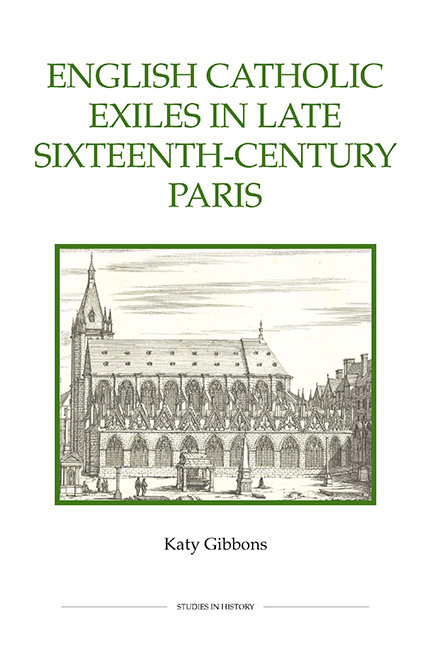Book contents
- Frontmatter
- Contents
- Acknowledgements
- Abbreviations
- Editorial conventions
- Introduction
- 1 The home and host contexts for Elizabethan exiles
- 2 Between civility and piety: exile niches in an urban environment
- 3 Exile in action: communicating and propagating the cause of radical Catholicism
- 4 Making sense of exile: alternative and competing representations
- 5 Returning or remaining? Divisions and longer-term developments in English Catholicism
- Conclusion
- Bibliography
- Index
2 - Between civility and piety: exile niches in an urban environment
Published online by Cambridge University Press: 11 May 2017
- Frontmatter
- Contents
- Acknowledgements
- Abbreviations
- Editorial conventions
- Introduction
- 1 The home and host contexts for Elizabethan exiles
- 2 Between civility and piety: exile niches in an urban environment
- 3 Exile in action: communicating and propagating the cause of radical Catholicism
- 4 Making sense of exile: alternative and competing representations
- 5 Returning or remaining? Divisions and longer-term developments in English Catholicism
- Conclusion
- Bibliography
- Index
Summary
The foreboding expressed by English informers about the gathering of English Catholics in Paris was a comment on their potential to influence events both at home and overseas. However, whilst exile involvement in invasion plots has long been acknowledged, the interactions between exiles and their hosts in Paris have been overlooked. Paris was a key node in an international network of Catholics interested in the future of England: the significance of the French environment, both for the future of the French kingdom and for the immediate fate of English Catholics, should not be underestimated.
The exile state presents a dilemma between integrating with the host environment and retaining a distinct group identity; this dilemma informs the ways in which an urban community is experienced. Philip Selznick discerns a continual tension between civility and piety as sources of integration in a moral community. Civility requires diversity and a degree of toleration, whilst piety, associated with a traditional, ‘folk’ society, demands devotion and integration. These two states, however, may not be entirely antagonistic, and it seems that English Catholics in Paris stood at a possible point of confluence. Their stay in Paris rested partly on ‘civil’ traditions of accommodating newcomers, whilst also drawing on their ‘pious’ appeal as Catholic coreligionists. This chapter seeks to explore the practical experiences of English Catholics in Paris, demonstrating how ‘civility’ and ‘piety’ provided them with a number of options. In addition to the plans for an invasion of England, the available sources of support for exiles in the city require exploration, as do issues of accommodation, education, employment, devotion and sociability. Before and after the sixteenth century Paris was recognised as an international melting pot. It was a ‘plurifunctional’ city whose many faces presented openings to newcomers. Paris's response to new arrivals was complex. The English, who often clustered around the university area on the Left Bank were neither fully represented nor well integrated within the city. They interacted with the Parisian environment in a number of key areas. Significantly, they did not become a settled, permanent presence and appear not to have sought this. Taking advantage of the prospects available in France in the 1580s, they nevertheless remained English Catholics, and much of their activity was oriented towards home.
- Type
- Chapter
- Information
- English Catholic Exiles in Late Sixteenth-Century Paris , pp. 49 - 83Publisher: Boydell & BrewerPrint publication year: 2011



